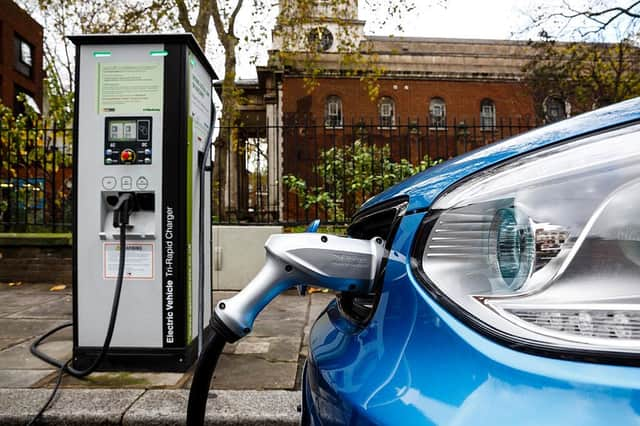How long does it take to charge an electric car? Time to fully charge an EV - and how much it costs at home or at a charging station


The use of electric cars is expected to soar over the next decade as Boris Johnson accelerated plans to cut emissions, in a bid to hit net zero targets.
The prime minister’s 10-point plan for a “green industrial revolution” will see the sale of new petrol and diesel vehicles phased out by 2030 - a decade earlier than initially intended.
Advertisement
Hide AdAdvertisement
Hide AdIn an effort to cut climate emissions and boost jobs, the government’s proposals outline an accelerated transition to electric vehicles.
A £1.3 billion investment will see charge points installed in homes, streets and motorways up and down the country in a bid to make electric vehicles easier to charge in years to come.
Grants will become available to urge people to buy zero or low emission vehicles while the government will invest in manufacturing electric vehicle batteries over the next four years.
But what does all this mean on a practical level for motorists? We take a look at how long it takes to charge an electric vehicle and the cost of doing so.
How long does it take to charge an electric car?
The time it takes to charge an electric car depends on a number of factors, including where you charge, the size of battery and the speed of the charging point.
Motorists who opt to buy an electric car don't have to go to the local pumping station to fill up if they have a charging point at home, or where they park their electric car.
Charging an electric car can be seen as similar to charging a mobile phone, with users doing so overnight and then when required during the day.
Other advantages include speed and safety of doing so at home.
Advertisement
Hide AdAdvertisement
Hide AdPod Point, a UK provider of electric vehicle charging, details on its website that "a typical electric car (60kWh battery) takes just under eight hours to charge from empty-to-full with a 7kW charging point".
A 3.7kW or 7kW charge point can provide between 15-30 miles of range per hour of charge, while a 50kW rapid charger could add up to 100 miles of range in approximately 35 minutes.
If drivers need to charge away from home then finding somewhere can be tricky, though the aim is for charge points to become more accessible at work and in car parks.
Zap-map, which shows charging points across the UK, currently displays more than 7,000 locations with a public charging point installed up and down the country.
How much does it cost to charge an electric car?
The cost of a charging an electric car also varies depending on make, model and where owners charge up.
There is an up-front expense of installing a home charging point, which costs upwards of £449 with a government OLEV grant.
Electric car drivers benefit from a £350 OLEV grant for purchase and installation of a home charger. There is then the electricity cost of charging.
For a typical electric car, with a 60kWh battery and a rough 200 mile range, it costs about £8.40 for a full charge at home, while it could cost around £6.50 for a 30-minute charge at a motorway service station, according to pod-point.com.
Advertisement
Hide AdAdvertisement
Hide AdSome public charge points (car parks) offer free charging for the duration of stay.
As well as cleaner for the environment, it could also be cheaper to run.
“The cost of driving an electric car is about 2-5p per mile, which means EV drivers can save up to up £1,000 a year when compared to driving a petrol or diesel car (which costs ~15p per mile),” pod-point.com states.
